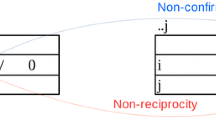Abstract
Studies using the Functional Pairs Approach to the study of socialization processes are reviewed, and its strengths and weaknesses are discussed. By staging social encounters between children and biologically unrelated adults, this approach can achieve excellent isolation of causal effects involving a wide range of behaviors. Its main limitation concerns the extent to which the results obtained from staged interactions between unfamiliar children and adults generalize to real parent-child relations. Through careful construction of experimental situations, this limitation can be partially overcome. Ultimately, the choice of a method will depend on several considerations, including the complexity of the behavior to be manipulated and the relative importance of generalizability versus clear isolation of effects. The decisions involved in investigating causal influences between parents and children are summarized in a flow chart.
Similar content being viewed by others
Reference note
Keller, B. B. The contrived participant approach in socialization research: Prospects and problems. Presented at the symposium, Parent, Child and Reciprocal Influences: New Experimental Approaches (E. J. Mash, chair), American Psychological Association, New York, September 1979.
References
Bandura, A., Ross, D. & Ross, S. A comparative test of the status envy, social power, and secondary reinforcement theories of identificatory learning.Journal of Abnormal and Social Psychology, 1963,67, 527–534.
Bates, J. E. Effects of a child's imitation vs. nonimitation on adult's verbal and nonverbal positivity.Journal of Personality and Social Psychology, 1975,31, 840–851.
Bates, J. E. Effects of children's nonverbal behavior upon adults.Child Development, 1976,47, 1079–1088.
Bell, R. Q., & Harper, L.Child effects on adults. Hillsdale, New Jersey: Erlbaum, 1977.
Berberich, J. P. Do the child's responses shape the teaching behavior of adults?Journal of Experimental Research in Personality, 1971,5, 92–97.
Cantor, N. L., Wood, D. D., & Gelfand, D. M. Effects of responsiveness and sex of children on adult males'behavior.Child Development, 1977,48, 1426–1430.
Etzel, B. C., & Gewirtz, J. L. Experimental modification of caretaker-maintained high-rate opérant crying in a 6- and 20-week old infant (Infans tyrannotearus); extinction of crying with reinforcement of eye contact and smiling.Journal of Experimental Child Psychology, 1967,5, 303–317.
Keller, B. B., & Bell, R. Q. Child effects on adult's method of eliciting altruistic behavior.Child Development, 1979,50, 1004–1009.
Osofsky, J. D. Children's influences upon parental behavior: An attempt to define the relationship with the use of laboratory tasks.Genetic Psychology Monographs, 1971,83, 147–169.
Stevens-Long, J. The effect of behavioral context on some aspects of adults' disciplinary practice and affect.Child Development, 1973,44, 476–484.
Wahler, R. G. Child-child interactions in free field settings: Some experimental analyses.Journal of Experimental Child Psychology, 1967,5, 278–293.
Yarrow, M. R., Waxier, C. Z., & Scott, P. M. Child effects on adult behavior.Developmental Psychology, 1971,5, 300–311.
Author information
Authors and Affiliations
Rights and permissions
About this article
Cite this article
Keller, B.B. The study of reciprocal influences through experimental modification of social interaction between functional adult-child pairs. J Abnorm Child Psychol 9, 311–319 (1981). https://doi.org/10.1007/BF00916835
Revised:
Issue Date:
DOI: https://doi.org/10.1007/BF00916835




